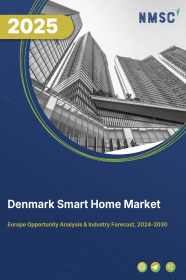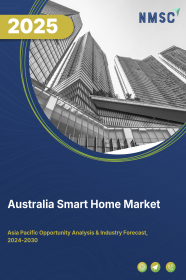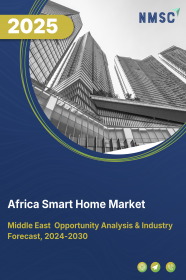
Denmark Smart Home Market by Product Type (Smart Lighting, Smart Home Security & Surveillance, Smart Entertainment, and Smart Appliances), by Communication Protocol (Wi-Fi, Zigbee, Z-Wave, Bluetooth, and Thread), by Smart Home Hubs (Standalone Hubs and Built-in Hubs), by Voice Assistants Integration (Amazon Alexa, Google Assistant, Apple Siri, and Others) – Opportunity Analysis and Industry Forecast, 2024–2030
Industry: Retail and Consumer | Publish Date: 15-Feb-2025 | No of Pages: 140 | No. of Tables: 104 | No. of Figures: 69 | Format: PDF | Report Code : RC2275
US Tariff Impact on Denmark Smart Home Market
Trump Tariffs Are Reshaping Global Business
Denmark Smart Home Market Overview
The Denmark Smart Home Market size was valued at USD 334.9 million in 2023, and is predicted to reach USD 1684.4 million by 2030, at a CAGR of 26.0% from 2024 to 2030. A smart home, also known as a connected home, is a living space equipped with state-of-the-art technology and automated systems designed to monitor and control a variety of household devices, appliances, and security features through a centralized network. These intelligent devices are remotely managed and often respond to voice commands or preset schedules, providing homeowners with enhanced convenience, energy efficiency, and security. Common components found in smart homes include smart thermostats, lighting systems, security cameras, voice assistants, and other interconnected devices tailored to enrich the overall quality of life.
Expanding Digitalization Trend is Driving the Denmark Smart Home Market
The growing digitalization trend in Denmark plays a pivotal role in accelerating the country's smart home market. As digital technologies become increasingly intertwined with various aspects of Danish life, there is a rising demand for smart home solutions that offer convenience, connectivity, and control. Denmark, known for its digital advancement, boasts a robust demand for cutting-edge software and IT products.
American hardware and software products are highly esteemed in Denmark, presenting opportunities for US businesses in this tech-savvy market. The country's solid digital infrastructure and high internet penetration provide essential connectivity for smart home devices to operate effectively. This alignment with the broader digitalization trend makes smart home technologies more enticing to Danish consumers, thereby driving their adoption and fueling the growth of the Denmark smart home market.
Rising Disposable Income Propels the Growth of the Denmark Smart Home Market Trends
In Denmark, where the average household net adjusted disposable income per capita exceeds the OECD average, standing at USD 33,774 annually, there exists a significant catalyst driving the growth of the robotic vacuum cleaner market. Danish households with higher disposable incomes show a greater inclination towards investing in advanced home automation technologies, including smart homes, as they aim to simplify domestic tasks and elevate their overall quality of life. This increased purchasing power aligns with the growing trend of adopting robotic solutions in Danish households, positioning the country as a thriving market for smart homes.
Security and Data Privacy Acts as Barrier to the Market Expansion
The connected home market faces a significant barrier to its growth due to concerns surrounding the security of interconnected systems. Devices such as thermostats, cameras, and door locks are susceptible to hacking, posing risks to residents' privacy and safety. Weak passwords or inadequate Wi-Fi network security measures often contribute to this vulnerability. Hackers exploit these weaknesses to gain unauthorized access, potentially compromising devices or accessing sensitive information. To mitigate these risks, homeowners must prioritize strong password practices, regularly update device firmware, and strengthen home networks to reduce the threat of cyber-attacks and safeguard their smart homes from potential breaches.
Integration of Blockchain Technology into Smart Home Devices Presents Lucrative Opportunity for Market Expansion
The integration of blockchain technology into smart home devices offers a promising avenue for strengthening the security and privacy of smart home systems. Renowned for its robust security and transparent features, blockchain technology encrypts and securely stores sensitive smart home data, empowering users to control access permissions and minimizing the risk of unauthorized intrusion. By validating device identities, blockchain ensures that only trusted devices interact within the smart home network, while also automating tasks through tamper-proof smart contracts.
Furthermore, blockchain decentralizes device control, mitigating vulnerabilities and streamlining access control and permissions management. The incorporation of blockchain into smart homes not only enhances security and privacy but also fosters a safer and more confidential smart home environment. Consequently, it is poised to unlock significant growth opportunities for the market.
Competitive Landscape
Several market players operating in the Denmark smart home industry include Honeywell International, Inc., Schneider Electric, ABB Ltd, Amazon, Gira, Samsung, LG Electronics, Google Home, Develco Products, D-Link Systems, Inc.
Denmark Smart Home Market Key Segments
By Product Type
-
Smart Lighting
-
Smart Bulbs
-
Smart Light Strips
-
Smart Switches
-
-
Smart Home Security and Surveillance
-
Smart Cameras
-
Video Doorbells
-
Smart Locks
-
Security System
-
-
Smart Entertainment
-
Smart TVs
-
Smart Speakers
-
Streaming Devices
-
-
Smart Appliances
-
Smart Refrigerators
-
Smart Ovens
-
Smart Washing Machines
-
Smart Dishwashers
-
Smart Home HVAC Management
-
Other Smart Appliances
-
By Communication Protocol
-
Wi-Fi
-
Zigbee
-
Z-wave
-
Bluetooth
-
Thread
By Smart Home Hubs
-
Standalone Hubs
-
Built-in Hubs
By Voice Assistants Integration
-
Amazon Alexa
-
Google Assistant
-
Apple Siri
-
Others
By Smart Home Compatibility with Smartphones
-
iOS
-
Android
By Installation
-
DIY Installation
-
Professional Installation
By Sales Channel
-
Online Retailers
-
Retailers
REPORT SCOPE AND SEGMENTATION:
|
Parameters |
Details |
|
Market Size in 2023 |
USD 334.9 Million |
|
Revenue Forecast in 2030 |
USD 1684.4 Million |
|
Growth Rate |
CAGR of 26.0% from 2024 to 2030 |
|
Analysis Period |
2023–2030 |
|
Base Year Considered |
2023 |
|
Forecast Period |
2024–2030 |
|
Market Size Estimation |
Million (USD) |
|
Growth Factors |
|
|
Companies Profiled |
10 |
|
Market Share |
Available for 10 companies |
|
Customization Scope |
Free customization (equivalent up to 80 working hours of analysts) after purchase. Addition or alteration to country, regional, and segment scope. |
|
Pricing and Purchase Options |
Avail customized purchase options to meet your exact research needs. |
KEY PLAYERS
-
Honeywell International, Inc.
-
Schneider Electric
-
ABB Ltd
-
Amazon
-
Gira
-
Samsung
-
LG Electronics
-
Google Home
-
Develco Products
-
D-Link Systems, Inc.

















 Speak to Our Analyst
Speak to Our Analyst




















